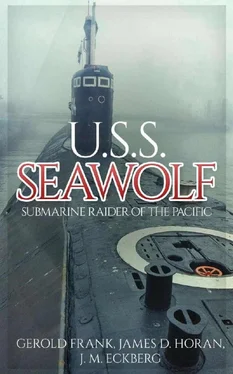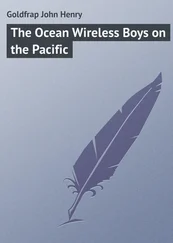Lieutenant Deragon cautioned us about talking ashore. And that was all.
We worried a little about what Captain Warder’s future plans were. Swede said it for all of us. “This is the way I feel about it. I hate like hell shipping out if we lose Freddy.” We had come to depend on him so much we couldn’t bear the thought of shipping out to sea under a new skipper.
The first night in port I met an old friend, Chief Torpedoman Francis Morales. He was having a beer with Sousa in Sousa’s room. The last time I’d seen Morales he was a husky man, pushing a big paunch in front of him. Now he looked almost haggard. He must have lost forty pounds. His hands shook when he lit a cigarette. He had been on the Rock, he said, almost to the end.
The Japs, he said, were devilishly clever. They worked on you every which way. “They wear you down physically,” he said, “and then they start on your minds. Before the end, those sons-of-bitches set up big loud-speakers on the Mariveles side of the shore, and they’d play American records at us—one song over and over again.”
“What records?” I said.
“They played ‘I’m Waiting for Ships That Never Come In,’” he said. “Then they’d play a weepy Christmas song sung by Bing Crosby. It would break your heart. Over and over again, blaring out over the water, like that. I tell you, it was horrible there at night. The boys were half-starved, they were sick and shaking with malaria, the wounded were crowding the Rock’s tunnels, and those bastards were playing Christmas songs.”
Months later I learned Morales’ true story. He was one of the most daring men on the Rock. He’d learn the location of Jap military stores, beg half a dozen sticks of dynamite, wrap them in waterproof paper, and get a PT boat to take him out to sea. Then, the dynamite tied to him, he would swim through the shark-infested waters to the beach, sneak through the Jap guards, plant the dynamite, set the fuse, and sneak back to the boat. He did this many times. After that he volunteered to sneak through the jungle to gather information on Jap positions. He never got caught. He was a good and a brave man.
That first night, when I got back, I had troubles of my own. My throat began to pain terribly. The next day it was worse. The pain was intense when I swallowed. I went to the doctor on the tender. He looked me over.
“You’ve got bad tonsils, chief,” he said. “Very bad. It’s the hospital for you.”
At the hospital I was told they’d have to take them out.
CHAPTER IX
Anchored in Sick Bay
I WAS told I’d be operated on in an Australian hospital. It was crowded with patients at the time and, since I was only a minor case, I waited. The Wolf remained in port several weeks and sailed on another mission more than a week before I went on the operating table. When I knew she was gone, I felt lower than I’d been in weeks. I don’t think I realized until then how much that steel hulk and the officers and men inside her meant to me. I saw pictures in my mind of the Wolf cruising along on the surface. I could hear the order, “Clear the bridge!” I saw the Skipper maneuvering for the kill. I knew then that nothing the Japs could do, save sending us to the bottom, could be as bad as being on the beach while my own ship was out to sea.
I was finally admitted to the hospital. It was a magnificent modern institution, the acme of medical efficiency. After I’d been divested of my clothes, had taken a shower, and put on a pair of roomy pajamas, I was given a bed. I was ready to drop off to sleep when a nurse came in with tray and a hypodermic.
“What’s that for?” I asked, a little alarmed.
“You’re due at the operating theater in about an hour and a half. We’re just getting you ready,” she said.
“Fine,” I said. “Let’s get it over with.”
She bent over me, swabbed my left arm, and stuck the hypo in.
“Now you just take it easy,” she said.
I looked at her. “What was that shot you gave me?” I asked.
“Why, that’s morphine, to relax you,” she said.
Uh, oh, I thought. I’d had previous experience with morphine. I knew how I reacted to it. It might relax other people. It knocked me out for hours.
“Did you say they wanted me up there in about an hour and a half?” I asked.
“Yes,” she said. “Why?”
“Well, miss,” I said, “I hope that was a weak shot of morphine you gave me. Just wait and see,” I said. I lay there, and it was just as I expected. My feet fell asleep. Then my hands and arms became numb. Just about this time two of the largest men I’ve ever seen in my life came to my bunk and without as much as a “How do you do?” picked me up as though I were a child, set me into a wheel chair, and started wheeling me away. I felt as though I were floating. I don’t remember arriving at the “theater.” It seems the operating room was in use when the two Aussies brought me there, so they left me outside the door. That’s the last I remember.
I was told later that the doctor who was going to assist the surgeon came out, looked at me, shook me, got no result, called for the surgeon. He took a good look at me and sent for the two giant orderlies to come and get me. They wheeled me back to my bunk and dumped me there. I woke up twelve hours later. I didn’t know what time it was, but it was dark. I thought, Well, that wasn’t bad. I didn’t even feel them take out my tonsils. These Aussie medics are O.K. I knew that after a tonsillectomy your throat feels sore, so I took a chance and swallowed. My throat felt swell. I attributed this to the fact that I was so rugged. I even smoked a cigarette, and it tasted fine.
I was lying there comfortably, congratulating myself, when a night nurse came by.
“How do you feel?” she asked.
“Fine,” I said, grinning at her. “There was nothing to it.”
“No,” she said, “that’s right. There wasn’t anything to it.” I thought I detected a sarcastic note in her voice, but I overlooked it because I felt so good.
“When can I leave here?” I asked. “I feel swell. No use staying any longer than I have to.”
“Well, I don’t know,” she said. “That all depends on when they take your tonsils out.”
“When they— What!” I must have shouted it, because heads started popping up all around the ward.
“I said,” she repeated quietly, “when they take your tonsils out. You blacked out yesterday morning. Why didn’t you let us know you were allergic to morphine?”
I was angry. “Why didn’t you let me know you were going to use morphine?” I demanded. “How do I know what you’re going to use in a place like this? For all I know it might be anything from dog blood to brain juice you’re sticking into me!”
“Well,” she said coldly, “there’s no doubt that you’ve had both those injections. Now, will you please be quiet?” And she walked away.
I was burning mad. I got up and sneaked into the kitchen and robbed the refrigerator of two pounds of assorted foods. I gulped them down. Then, smug and self-satisfied, I got back into bed.
The next morning about 10 o’clock a Dr. Smith came around. He was young and pleasant.
“Well, chief,” he said, “how do you feel?”
“Fine,” I said. “When are we going to get this over with?”
“Oh, let’s see,” he said. “Today’s Tuesday. Let’s make it tomorrow morning, shall we?”
“The sooner the better, as far as I’m concerned,” I said. “I’ve already had them out once—or so I thought.”
“Yes,” he said, smiling. “I heard about it from the head nurse. What did you do? She’s all up in the air about the way you talked to one of her nurses.”
Читать дальше






![Hubert Bancroft - The Native Races [of the Pacific states], Volume 5, Primitive History](/books/749157/hubert-bancroft-the-native-races-of-the-pacific-s-thumb.webp)

![Hubert Bancroft - The Native Races [of the Pacific states], Volume 1, Wild Tribes](/books/750126/hubert-bancroft-the-native-races-of-the-pacific-s-thumb.webp)



![Edward Ellis - Adrift on the Pacific - A Boys [sic] Story of the Sea and its Perils](/books/753342/edward-ellis-adrift-on-the-pacific-a-boys-sic-s-thumb.webp)